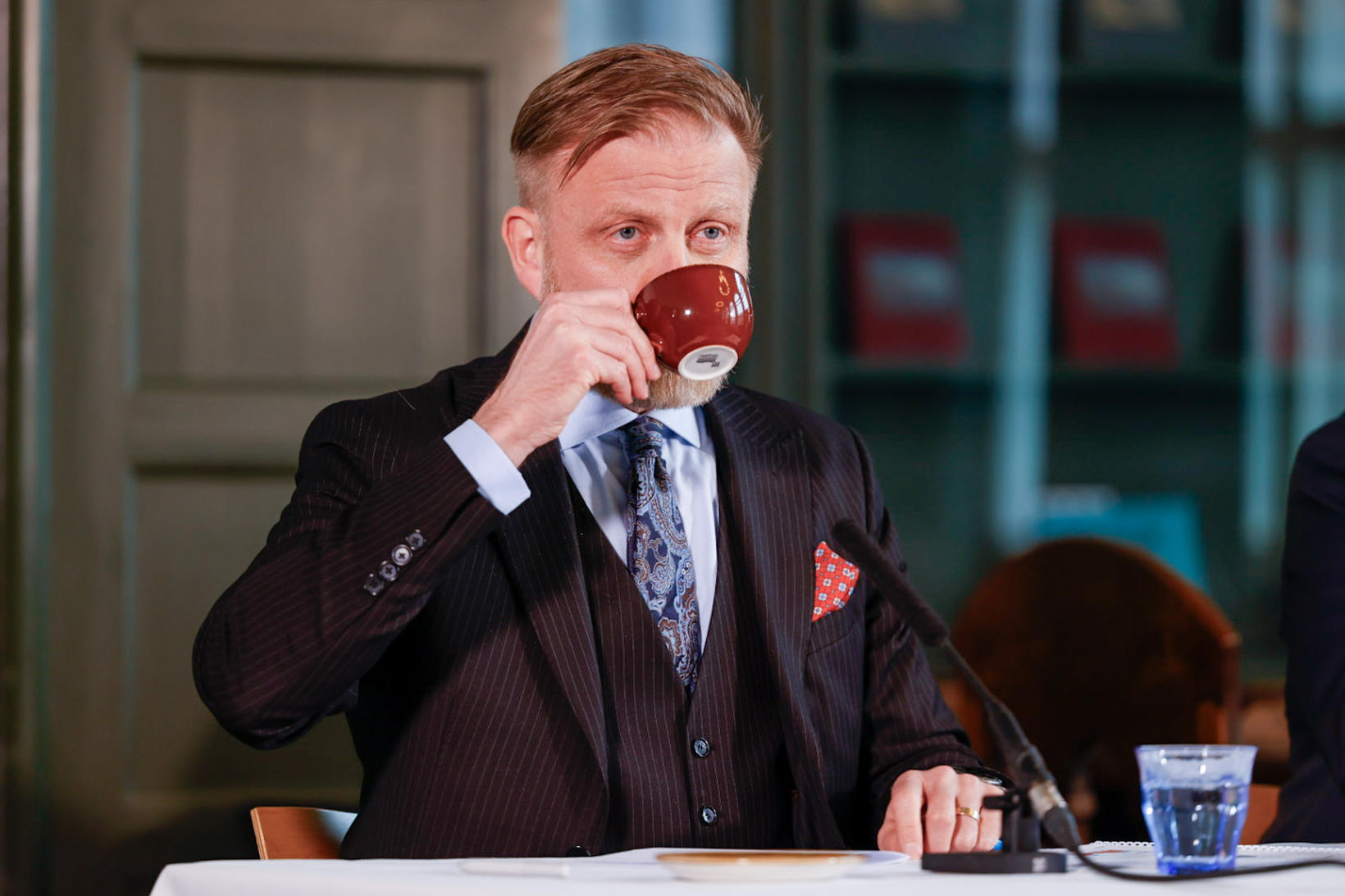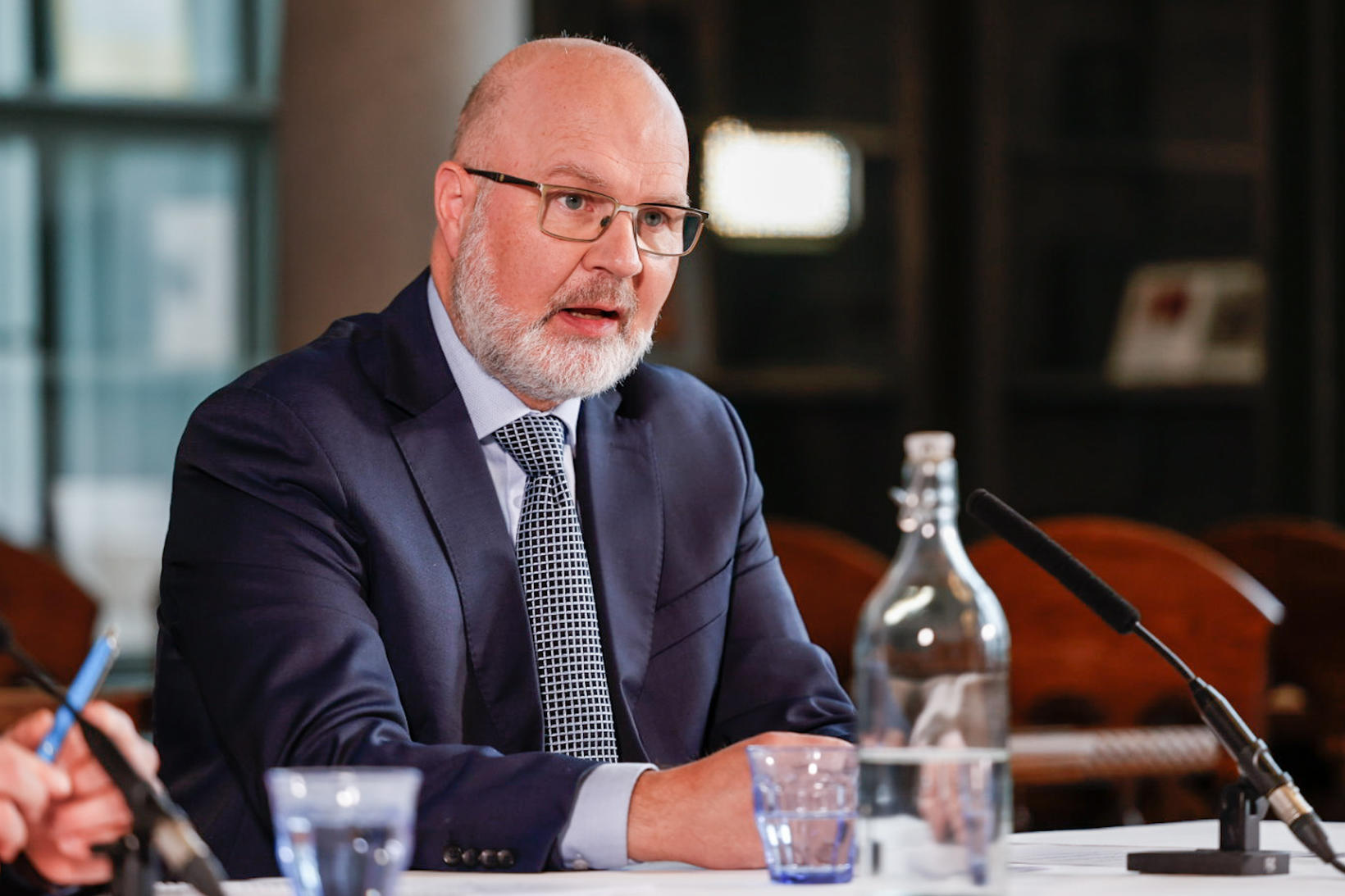"The program is working" – Central Bank governor optimistic amid rate cut
Central Bank Governor Ásgeir Jónsson at the meeting this morning. He seemed quite optimistic about the situation in Iceland. mbl.is/Karítas
Despite global concerns over a potential tariff war and its possible impact on Iceland, Central Bank Governor Ásgeir Jónsson struck a positive tone at today’s Monetary Policy Committee briefing. He expressed confidence that inflation will continue to decline, which could pave the way for lower real interest rates.
This morning, the policy rate was cut for the fourth consecutive time, decreasing by 0.25 percentage points to 7.75%.
Inflation forecasts on track
Jónsson repeatedly emphasized that inflation forecasts are proving accurate, and he expects both inflation and inflation expectations to continue falling. He also noted that there are no major debt concerns within the system.
"The program is working," Jónsson stated, reinforcing his belief that Iceland’s economic outlook remains strong.
Jónsson anticipates that inflation will drop further in the coming months.
"We assume that the 12-month rate will decrease in the next measurement," he said, referring to the March inflation figures, which will be published next week.
Iceland on target to reach its inflation target
At today’s Monetary Policy Committee briefing, Central Bank Governor Ásgeir Jónsson reaffirmed his confidence in the current economic trajectory, expressing hope that Iceland is on track to reach its inflation target.
"We just hope that this will continue and that we are going to drive this to the target," Jónsson said.
The Central Bank’s target is an inflation rate of 2.5%, with a 1.5 percentage point margin. With inflation steadily declining, the bank cut the policy rate for the fourth consecutive time this morning, lowering it by 0.25 percentage points to 7.75%.
"This is working very well now, and we are not going to stop what is working well," Jónsson added.
Public inflation expectations and a potential educational campaign
During the briefing, Jónsson was asked about household inflation expectations, which had not followed the recent decline in inflation according to the latest survey. He downplayed the concern, noting that it was only a single survey, and said expectations would likely adjust as inflation continues to fall.
He also pointed out that many Icelanders, particularly after the financial crash, have preferred investing in real estate rather than stocks. As a result, some may need to see clear signs of stabilizing housing prices before their inflation expectations reflect broader economic trends.
Jokingly, Jónsson suggested that the Central Bank might launch an educational campaign if public expectations do not align with actual inflation figures in the coming months.
Not yet time to ease real interest rates
With Iceland’s real interest rate currently around 4%, Jónsson stated that the Monetary Policy Committee still considers it too soon to ease interest rate control, citing inflation expectations that remain too high. However, he emphasized that as inflation continues to decline, expectations should follow, which would be a key factor in eventually adjusting the real interest rate policy.
"That is, to some extent, a prerequisite for us to also start relaxing real interest rate control," he explained.
Þórarinn G. Pétursson, Deputy Governor for Monetary Policy, at the meeting this morning. mbl.is/Karítas
Unclear impact of global tariff war on inflation
Regarding international economic developments, Þórarinn G. Pétursson, Deputy Governor for Monetary Policy, acknowledged concerns about a potential tariff war but said it was too early to predict its exact impact on Iceland’s inflation outlook.
"If these tariff increases take effect and persist, the economic outlook could worsen further. This could affect Iceland’s export market, but it’s difficult to determine whether it will increase or decrease inflation. We will need to see how it unfolds before making further assessments," Pétursson stated.
The Central Bank is closely monitoring the situation and plans to publish a more detailed analysis in the May issue of Monetary Affairs.
Could a tariff war lower inflation in Iceland?
Jónsson was also asked about remarks he made years ago in a university economics class, suggesting that a global tariff war could, in some cases, reduce inflationary pressure in third countries like Iceland.
He explained that the effects could be complex. For example, U.S. tariffs on aluminum could drive down aluminum prices in Europe, as companies might redirect exports there if the U.S. restricts imports. At the same time, tariffs could make certain goods—like American cars—more expensive.
Global reactions will be key
Jónsson emphasized that much depends on how other countries respond to U.S. tariff policies.
"The United States is not the whole world. If other countries choose to impose retaliatory tariffs on the U.S. rather than start a broader tariff war, the result might be that the U.S. isolates itself from the international system—while global trade continues," he explained.
For instance, Canada could shift its export focus to Europe, altering global trade dynamics. Jónsson stressed that Iceland’s economic outlook will depend on how these global shifts unfold in the coming months.







/frimg/1/57/87/1578747.jpg)


